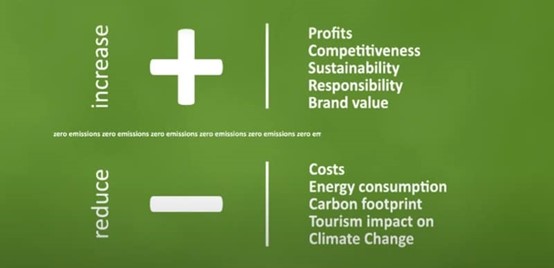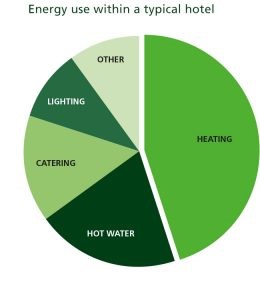About 40% is total energy is used on heating, and further 20% on hot water. Here are some green hotel tips to reduce your energy use:
- Keep the temperature of lounge, bar and bedrooms to no more than 21C. This is more than high enough to ensure guests are comfortable.
- The temperature in the kitchen can be considerably lower as plenty of heat will be generated here anyway. 16-17C will be fine, you can apply this to your laundry area as well if you have one.
- Staff and guests should be encouraged to keep heat in the building during hours you have the heating on. Polite notices next to windows explaining your green reasons for this will help. If guests need to open windows, then you have the heating too high and are wasting energy!
- Ensure hot water is stored at 60oC. Your guests won’t need water any hotter than this. This temperature will also kill Legionella bacteria.
Lighting accounts for up to 15% of hotel energy use:
- Encourage staff to turn off lights when they leave rooms. Unused rooms with lights on are wasting energy and costing you money.
- Guests can also be part of your green journey. Place a smart, polite note next to the light switch as they leave the room.
- Check any lights on timer switches in lounge, bar, or communal areas. Timer should be set for trading hours so you don’t waste energy (and money).
Low-cost green hotel tips
These low-cost green hotel tips will reduce your hotel energy use for hot water and heating. The small investment required will soon be outweighed by the saving you will make in lower energy bills:
- Be sure your boiler has a regular, annual service. An efficient boiler will use the minimum energy to reach the temperatures you set.
- You can insulate your hot water tank and pipes to conserve energy. This is a very low-cost energy-saving measure, you can recoup the cost within a few months.
- Buy and fit TRVs (Thermostatic Radiator Valves). These adjust the heat emitted from a radiator. Very useful for lounge or bar areas that can fill up with people. As the room gets busy, body temperature will increase the room temperature. The TRV will reduce the heat from the radiator, reducing the energy use to heat the room.
There are also low-cost green hotel tips to reduce electricity used in lighting:
- Install occupancy sensors in guest bedrooms and bathrooms. These ensure electricity is only used for lighting when the rooms are in use.
- Standard light bulbs are not very efficient. If you upgrade to LEDs you will benefit from lower electricity use (and lower bills). LEDs use up to 80% less electricity than standard bulbs. You can expect to get around 50,000 hours of use from them.
The importance of energy saving in hotels
Energy saving in hotels is important for several reasons:

- Cost Savings: The most immediate and tangible benefit of energy-saving hotel practices is reduced operating costs. Energy is a significant expense for hotels, and reducing energy usage can lead to substantial savings.
- Environmental Sustainability: The hospitality industry has a considerable environmental footprint. By adopting energy-saving measures, hotels can reduce their carbon emissions, contributing to the global effort to combat climate change.
- Regulatory Compliance: In many jurisdictions, regulations require businesses to reduce their energy consumption or use energy more efficiently. By adopting energy-saving measures, hotels can ensure they comply with these regulations.
- Guest Preferences: Increasingly, consumers are choosing to patronize businesses that demonstrate a commitment to sustainability. Hotels adopting energy-saving measures may attract customers, particularly those prioritizing environmental responsibility.
- Corporate Social Responsibility (CSR): More and more companies are recognizing the importance of acting responsibly and ethically, which includes minimizing their environmental impact. Energy-saving measures in hotels can be an important part of a broader CSR strategy.
- Resilience to Energy Price Fluctuations: By reducing their energy consumption, hotels can make themselves less vulnerable to energy price increases or supply disruptions.
- Long-term Sustainability of the Business: In the long term, businesses that fail to adapt to the reality of a carbon-constrained world may be at a competitive disadvantage. By adopting energy-saving measures now, hotels can position themselves for success in the future.
In summary, energy saving in hotels is not just a matter of doing what’s right for the environment, although that’s certainly a key part. It’s also a smart business strategy that can lead to cost savings, enhanced reputation, regulatory compliance, and long-term business sustainability.
How to save electricity in hotels?
Various energy-saving methods in hotels can save energy, many of which can be implemented relatively easily and inexpensively. Here are some key strategies:
- Install LED Lighting Throughout the Hotel
- Use Smart Lighting Technology,
- Install hotel key card switch.
- Solar Panel Technology
- Automatic Shutdown Sockets
- Predictive Monitoring
- Smart Water Management
- Install Thermostats
- Insulate the Pipework
- Repair Leaky Taps
- Install Air-Source Heat Pumps
- Encourage staff participation
- Educate your guests
Implementing these energy-saving methods can help hotels reduce their environmental impact, save money, comply with regulations, and meet the expectations of increasingly eco-conscious guests.
